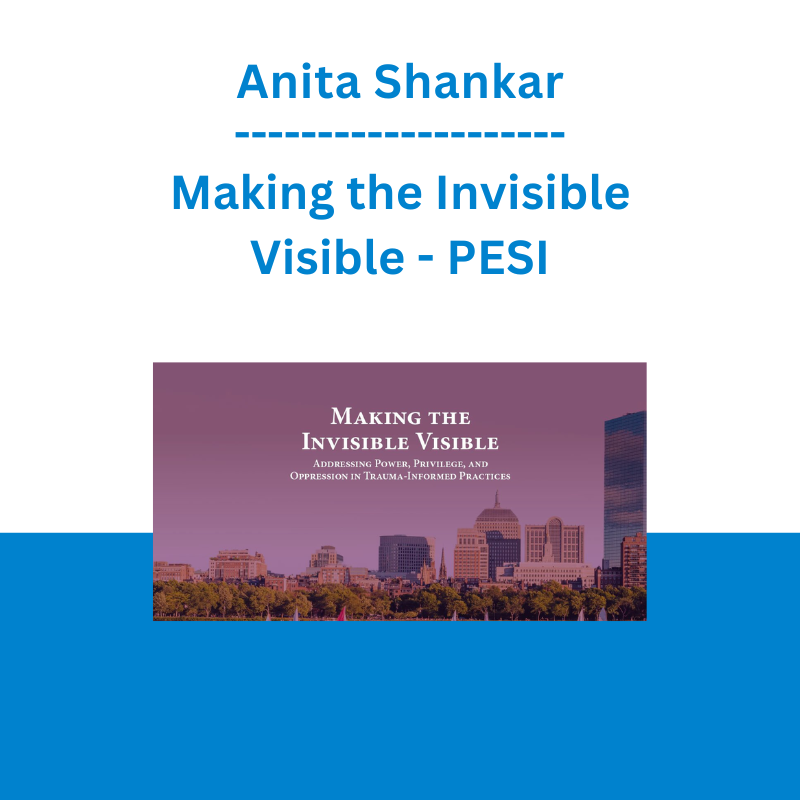*** Proof of Product ***
Exploring the Essential Features of “Anita Shankar – Making the Invisible Visible: Addressing Power, Privilege, and Oppression in Trauma-Informed Practices – PESI”
Making the Invisible Visible: Addressing Power, Privilege, and Oppression in Trauma-Informed Practices
Speakers: Anita Shankar, MPH | Ilya Yacevich, MA, LMFT
Duration: 3 Hours 45 Minutes
Format: Audio and Video
Description
Global Trauma Project (GTP), based in Kenya, supports local changemakers around the world to strengthen trauma-informed programming that is accessible, culturally-relevant, and proven to show significant impact. Presenters will share their experiences utilizing Trauma-Informed Community Empowerment (TICE) – GTP’s evidence-based framework that allows for fidelity to effective mental health supports and flexibility to local contexts. As an adaptable, contextualized foundation, TICE strengthens the capacity of community providers, who are often doubly at risk because they are themselves experiencing high stress, and serving communities impacted by compounded stress, complex trauma, and historical injustice.
Confronting systems of oppression within global mental health is core to GTP’s process. Speakers will discuss how deconstructing power and privilege, including the construct of whiteness, can unburden not only those bearing the brunt of oppression, but also those holding power, whether consciously or unconsciously.
Finally, this session will introduce participants to the core concepts of the TICE Framework, and how it has been applied to key GTP programmatic offerings of Preventing Violent Extremism, reducing Sexual/ Gender Based Violence, and promoting youth development. Case examples from Kenya, South Sudan, Ethiopia, and the United States will highlight the relevance of TICE within program assessment, staff support, curriculum design, training, mentoring, and supervision.
Speakers
Anita Shankar, MPH
Anita Shankar, MPH, believes access to relevant mental health resources is a social justice issue. As Senior Director of the Global Trauma Project, she utilizes the Trauma-Informed Community Empowerment (TICE) Framework to build the capacity of community leaders and government officials. Ms. Shankar’s 20 years of public health experience is influenced by the fields of popular education, youth development, harm reduction, and positive sexuality. She earned her Master’s degree in Public Health from the University of North Carolina, Chapel Hill, USA and Bachelor’s in International Development from the University of California, Berkeley, USA.
Speaker Disclosures:
Financial: Anita Shankar is the senior director of the Global Trauma Project and is an associate trainer with Sub-Saharan Africa RedR UK. She receives a speaking honorarium from PESI, Inc. She has no relevant financial relationships with ineligible organizations.
Non-financial: Anita Shankar has no relevant non-financial relationships.
Ilya Yacevich, MA, LMFT
Ilya Yacevich, MA, LMFT, lives in Nairobi, Kenya, Founding Director of the Global Trauma Project (GTP) and developer of the “Trauma-Informed Community Empowerment” (TICE) framework. This children and families with histories of complex and inter-generational trauma in East Africa, Greece and Indian Reservations in the US.
Speaker Disclosures:
Financial: Ilya Yacevich is the founder of Global Trauma Project. She receives a speaking honorarium and recording royalties from PESI, Inc. She has no relevant financial relationships with ineligible organizations.
Non-financial: Ilya Yacevich has no relevant non-financial relationships.
Objectives
- Support the core concepts of the Trauma-Informed Community Empowerment (TICE) Framework.
- Extrapolate how TICE Core Concepts have been contextualized to different communities.
- Measure issues of power and privilege relevant to global mental health.
- Conclude which supports best strengthen the capacity of local changemakers.
Outline
Attendees will learn the following strategies to improve their practice/ clinical outcomes:
- Importance of contextualized, community-led mental health initiatives
- Relevance of having a flexible, foundational framework
- How the TICE Framework has been applied to various topics, including but not limited to:
- Preventing Violence Extremism
- Sexual & Gender Based Violence
- Youth Development
- How the TICE Framework has been adapted to various contexts, including but not limited to:
- Kenya
- Ethiopia
- South Sudan
- United States
- What supports best strengthen the capacity of local changemakers
- How trauma-informed DMEL strategies can be implemented, particularly within under-resourced communities exposed to stress, crisis, adversity, compounded stress, complex trauma, collective trauma, intergenerational trauma
- How to acknowledge, counteract, and prevent power/privileges within global mental health
Target Audience
- Counselors
- Social Workers
- Psychologists
- Psychotherapists
- Therapists
- Marriage & Family Therapists
- Addiction Counselors
- Case Managers
- Physicians
- Nurses
- Other Mental Health Professionals
Please see the full list of alternative group-buy courses available here: https://lunacourse.com/shop/









